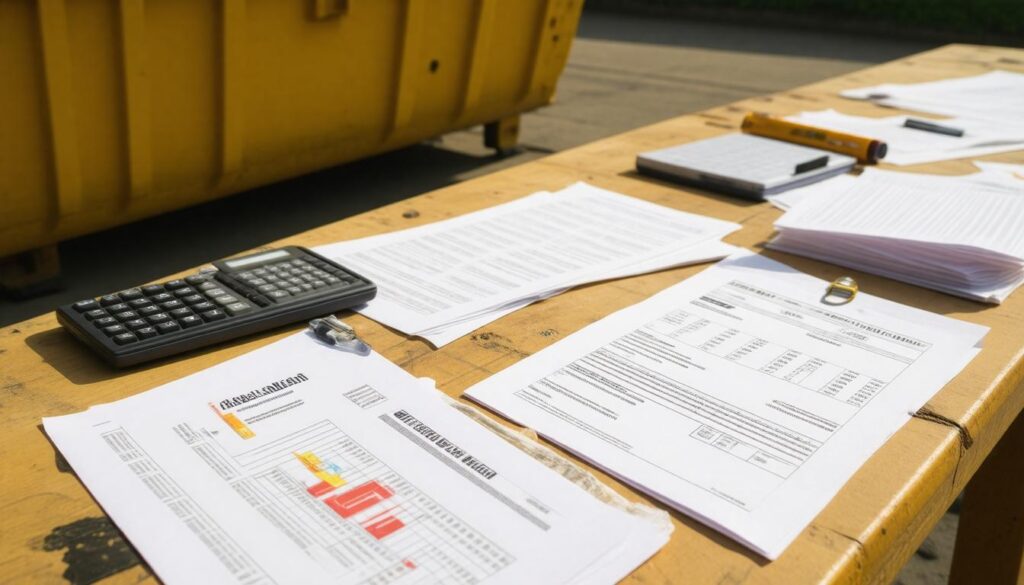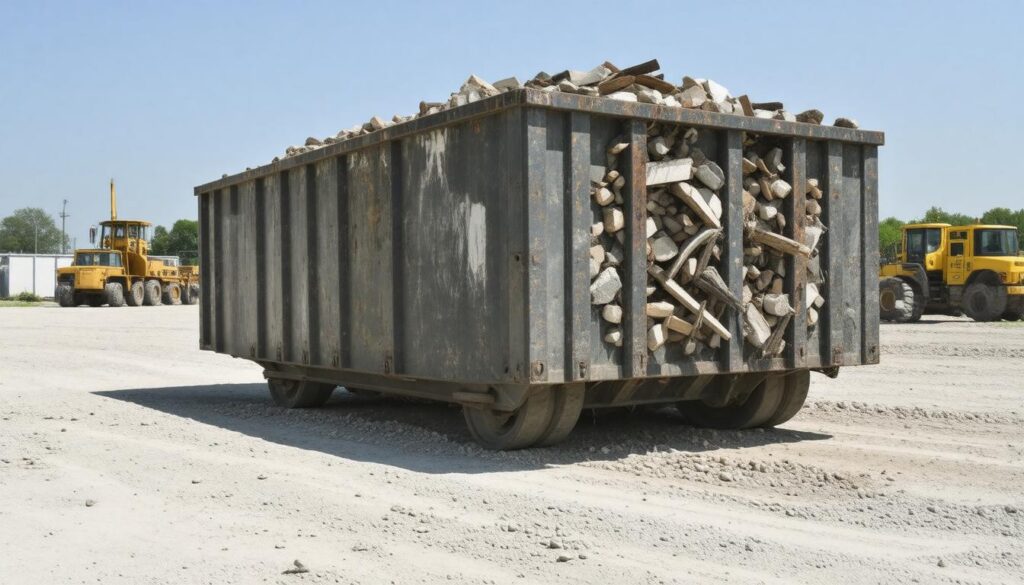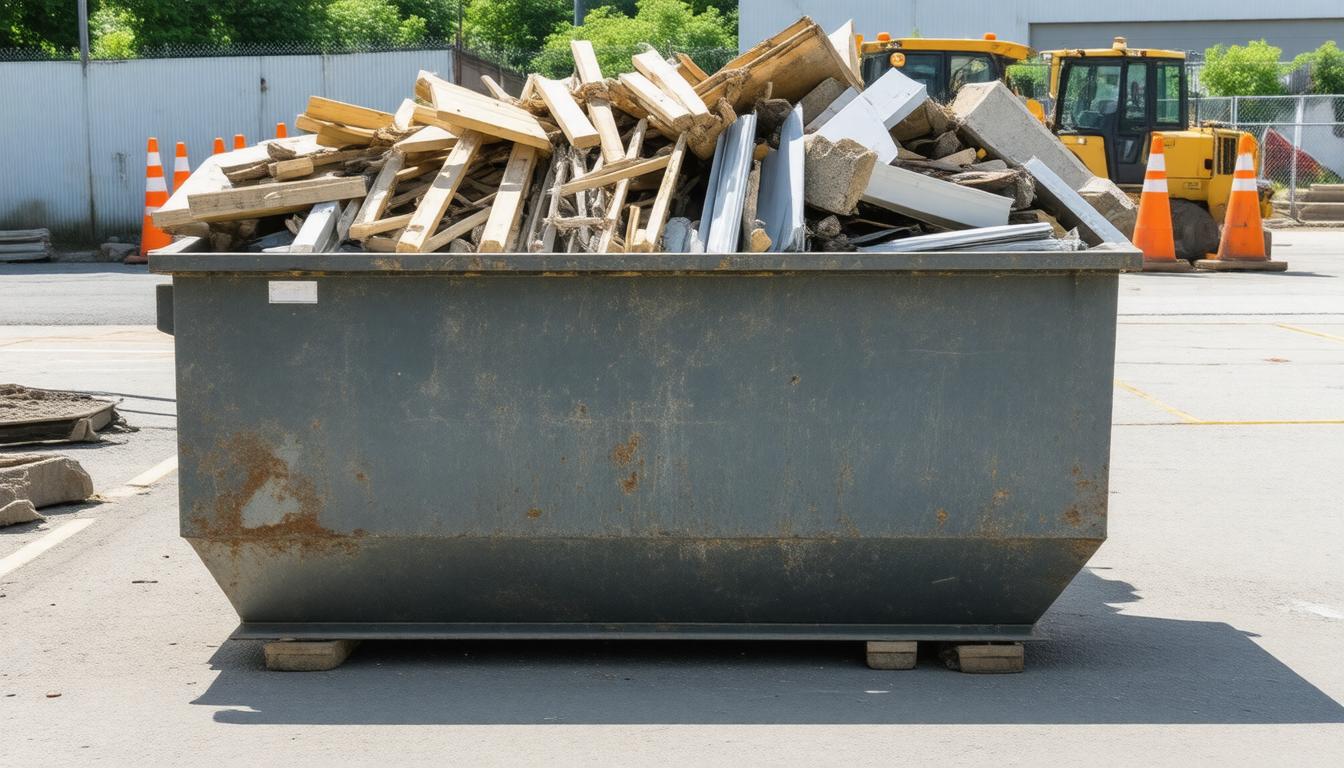When you’re working on a construction or renovation project, dealing with the leftover debris can quickly become overwhelming. A construction dumpster rental offers a simple, affordable way to keep your site clean and organized, making your job easier and safer. These dumpsters are built tough to handle heavy materials and come in different sizes to fit the needs of any project—from small home updates to large commercial builds. Knowing what goes into choosing the right dumpster can save you time, money, and a lot of hassle down the road.
A construction dumpster is a large, durable container designed to handle heavy debris commonly generated during building or renovation projects. When choosing one, consider the size needed based on your waste volume—ranging from 10 to 40 cubic yards—and factor in project duration, type of materials, and local regulations to ensure efficient and compliant waste management.
What is a Construction Dumpster?
A construction dumpster is more than just a big trash bin—it’s a rugged, purpose-built container designed to handle the messiest waste that building and demolition projects throw at you. Made from tough steel, these dumpsters come in a range of sizes, from smaller 10-yard units suitable for minor renovations to massive 40-yard containers built for large-scale commercial jobs or extensive landscaping projects.
Their robust construction means they can withstand heavy, sharp debris like concrete chunks, scrap metal, wood offcuts, and bricks without buckling or spilling contents.
What sets construction dumpsters apart from regular waste bins is their capacity to handle materials that aren’t just bulky but often unusually heavy or dense. Think about the types of refuse generated during a typical remodel: plasterboard scraps, bricks with mortar crusted on them, broken tiles, even old roofing materials.
These items need a container sturdy enough not just to hold them but also to endure frequent loading by machinery or manual laborers. Using a standard garbage bin for this kind of waste would be inefficient at best and dangerous at worst.
Size matters when picking your construction dumpster because it directly impacts how many trips you’ll need to haul waste away—and that affects your project’s timeline and budget.
Smaller dumpsters in the 10-20 yard range are perfect for brief renovation tasks or residential clean-ups where volume is limited but heavy material might still be present. On the other hand, if you’re overseeing new builds or prolonged constructions extending over weeks or months, opting for larger 30-40 yard roll-offs can provide ample space to consolidate more debris in a single container, reducing hauling frequency.
Beyond size and strength, consider the type of dumpster best suited for your project structure. Roll-off dumpsters—named for their ease of being rolled on and off trucks—offer great flexibility due to their large sizes and open tops that make loading quick and easy.
In contrast, front-load dumpsters, typically smaller and more compact, are designed for businesses needing ongoing waste management with regular pickups rather than discrete construction cleanups.
| Dumpster Type | Typical Size (Cubic Yards) | Best Used For | Loading Method |
|---|---|---|---|
| Roll-Off Dumpster | 10 – 40 | Large renovations, commercial builds | Open top; loaded by hand or machine |
| Front-Load Dumpster | 2 – 8 | Commercial properties with routine trash | Closed lid; mechanical arm lifts |
When choosing your dumpster size and type from providers like Tiger Sanitation in San Antonio—reachable at (210) 333-4287—always think about exactly what kinds of materials you’ll be disposing of and how much there will be over your project duration. Planning ahead prevents costly overruns by avoiding unnecessary swaps or overfilled bins.
“Renting the right size dumpster upfront saved our project several headaches,” shares Maria G., project manager. “Tiger Sanitation helped us choose the perfect roll-off size that fit our worksite perfectly.”
Understanding the varying sizes and types of dumpsters arms you with practical knowledge to avoid delays and extra costs on the job site. Next, we’ll examine what factors influence selecting the most appropriate dumpster size tailored exactly to the scope of your construction project.
Choosing the Correct Size for Your Project
Selecting the right dumpster size is more than just guessing—it’s about matching the dumpster’s capacity with the amount and type of waste your project will generate. Picture this: you rent a small dumpster for what you think is a modest remodel, only to find it overflowing halfway through and having to order an extra bin. This not only disrupts your work but also drives up costs unnecessarily. On the other hand, renting a dumpster too large can mean paying for space you don’t actually need, tying up your budget in waste management.
Smaller dumpsters, typically around 10 to 15 cubic yards, are perfect for projects producing less debris, such as minor home renovations or cleanups. Think of replacing kitchen cabinets or remodeling a bathroom—these jobs generate manageable waste volumes that fit comfortably into these smaller containers. Since each cubic yard holds roughly one pickup truck load, a 10-yard container offers a compact yet efficient solution.
Moving beyond those smaller tasks, projects expand quickly in scope and debris volume.
Larger-scale renovations or new constructions demand heftier dumpsters ranging from 20 to 40 cubic yards. For example, building a home extension or clearing out old siding produces heavy materials like lumber or concrete that require both volume and strength in your waste container. A 20-yard dumpster covers medium-sized needs like extensive landscaping or deck removal projects. When you envision sizable home renovations or small commercial jobs, stepping up to a 30-yard dumpster often strikes the right balance between capacity and maneuverability.
Common Sizes
| Dumpster Size | Typical Use Case |
|---|---|
| 10-Yard | Small cleanups and minor remodels |
| 20-Yard | Medium projects like decks or landscaping |
| 30-Yard | Major residential renovations or light commercial waste |
| 40-Yard | Large builds or multi-room remodeling jobs |
Keep in mind that waste weight matters too. Construction debris like concrete and bricks weigh significantly more than wood or drywall, so heavier debris limits how much can safely fit into the container before reaching weight restrictions. Planning based solely on volume without considering material type can lead to penalties from overloading.
Once you’ve identified the correct size aligning with your project needs, understanding cost implications becomes equally important.
Rental prices often correspond to dumpster size but also fluctuate based on rental duration, location-specific regulations, and disposal fees dictated by local landfills. Tiger Sanitation advises scheduling delivery thoughtfully—this prevents delays and ensures proper placement on-site without obstructing daily operations. Their expert team can help guide you towards the right size based on detailed project parameters to avoid surprises later.
To get the most value, request multiple quotes from reliable providers like Tiger Sanitation (phone: (210) 333-4287). This lets you compare pricing transparently while clarifying services offered—including roll-offs for big jobs or front-load dumpsters suited for ongoing commercial waste management like restaurants and retail spaces.
Choosing your dumpster wisely isn’t just about hauling away trash—it directly impacts your project’s flow, safety compliance, and budget efficiency. So take time upfront to weigh your options; it’s a step that pays dividends throughout your build.
With dumpster sizing settled, it’s crucial to navigate the next challenge: understanding how rental fees and payment plans might influence your overall project costs and convenience.
Rental Costs and Payment Plans
 When you rent a construction dumpster, the price often depends on factors like the size of the dumpster, how long you keep it, your location, and what kind of waste you’re disposing of. On average, expect to invest between $300 to $800 for a standard rental lasting about a week to ten days. For instance, renting a 20-yard dumpster might hover around $450, but watch out—extra fees can appear if you go over the weight limit or need to extend your rental.
When you rent a construction dumpster, the price often depends on factors like the size of the dumpster, how long you keep it, your location, and what kind of waste you’re disposing of. On average, expect to invest between $300 to $800 for a standard rental lasting about a week to ten days. For instance, renting a 20-yard dumpster might hover around $450, but watch out—extra fees can appear if you go over the weight limit or need to extend your rental.
What’s essential here is not just the sticker price but understanding how rental durations and weight limits work together. Many providers set a weight cap because heavy debris like concrete or bricks can increase hauling costs substantially. Going beyond these limits means additional charges, so estimating your waste volume accurately from the start benefits both your wallet and your workflow.
Now, let’s talk payment. Rental companies usually offer several options designed to accommodate diverse project needs and budgets, providing some flexibility when managing expenses.
Payment Options
| Payment Plan | Description |
|---|---|
| One-Time Payment | Pay the full rental amount upfront—and know exactly what your cost will be. |
| Installment Plan | Spread out payments evenly throughout your project timeline for easy budgeting. |
| Pay-per-Use | Charges based on actual volume or weight if you exceed pre-agreed limits—fair but requires close monitoring. |
Choosing a one-time payment plan brings simplicity: you pay once, and it’s done. This works best if your project is straightforward and well-planned. For longer or unpredictable projects, installment plans can be lifesavers—they smooth out cash flow by breaking down payments into manageable pieces aligned with project milestones.
The pay-per-use option appeals especially to jobs where waste output may fluctuate wildly, such as remodeling projects where demolition reveals unexpected debris. However, this option demands vigilance since costs can surge if waste exceeds allowances abruptly.
A smart tip to avoid surprise fees is clarifying all weight restrictions and overage charges ahead of signing any contract. Tiger Sanitation, for example, emphasizes transparency in pricing—it’s always wise to request a detailed quote explaining what’s included and any potential extra charges with their sanitation services.
Additionally, timing plays a crucial role: scheduling dumpster delivery and pickup efficiently helps prevent unnecessary prolonged rental fees. Ensuring there’s ample space and accessibility beforehand reduces delays and operational headaches.
“Project managers who plan their dumpster rentals well ahead often save significant time and money – it’s about foresight as much as price,” shares a local construction supervisor who frequently partners with Tiger Sanitation.
Cost considerations aside, it’s equally important to understand which types of junk and debris are accepted in rental dumpsters to prevent costly violations and keep your project running smoothly.
Accepted Junk and Debris Types
 Construction dumpsters are designed with versatility in mind, capable of handling a wide variety of debris generated at typical job sites. However, not every kind of waste is welcome—or safe—to throw in one of these containers.
Construction dumpsters are designed with versatility in mind, capable of handling a wide variety of debris generated at typical job sites. However, not every kind of waste is welcome—or safe—to throw in one of these containers.
The key to maximizing your dumpster rental is knowing exactly what qualifies as acceptable debris. This includes common materials like wood, drywall, bricks, concrete, and metal. Each of these items breaks down the core waste products you’re likely dealing with during renovations or builds. For instance, wood scraps from framing, old drywall sections from demolition, piles of bricks left after a wall removal, chunks of concrete from foundation work, and scrap metal from plumbing or electrical updates all fit comfortably within the dumpster guidelines.
- Acceptable:
- Wood: Including lumber offcuts, pallets, and untreated timber
- Drywall: Broken sheets and scraps free of mold or hazardous substances
- Concrete: Chunks or rubble resulting from demolition or site clearing
- Bricks: Leftover masonry pieces that need disposal
- Metal: Pipes, wiring scrap, nails, and other non-hazardous metallic waste
Conversely, there’s a strict line drawn around materials classified as hazardous or environmentally sensitive. Items like paint cans, solvents, chemicals, batteries, tires, and electronic waste cannot be placed in standard construction dumpsters.
These materials require specialized handling due to their potential to pollute soil or water and pose human health risks if disposed of improperly. One pitfall many renters fall into is tossing banned items either out of convenience or ignorance. This can lead to contamination fees that inflate your rental cost far beyond initial estimates.
Moreover, local regulations often govern what types of waste dumpsters can accept and how those materials must be separated for recycling or landfill purposes. Ignoring these rules isn’t just a financial risk — it can derail your entire project timeline if authorities intervene with fines or mandatory cleanups.
Beyond debris restrictions, many rental providers like Tiger Sanitation recognize the hurdles their clients face and offer added services such as roll-off flexibility, valet pickups, and recycling programs. These options help keep your project manageable by taking some waste management complexity off your plate.
| Waste Type | Disposal Requirements | Additional Notes |
|---|---|---|
| Wood | Can be disposed in roll-off dumpsters | Avoid treated/painted lumber |
| Drywall | Acceptable if free from contaminants | Dispose separately if moldy |
| Concrete & Bricks | Bulk disposal allowed | Heavy weight may affect pricing |
| Metal | Accepted for recycling | Separate ferrous/non-ferrous for savings |
| Hazardous Waste | Requires special hazardous waste service | Illegal in standard dumpsters |
| Electronics | Handled by e-waste recyclers | Should never go in general dumpsters |
Planning ahead with clear knowledge about what qualifies as accepted junk saves time and money while allowing you to focus on your build rather than waste headaches.
When renting from trusted companies like Tiger Sanitation (Phone: (210) 333-4287), you gain access not only to well-maintained dumpsters sized for projects big and small but also the peace of mind that comes with expert sanitation guidance.
If you’re ever unsure whether certain materials are accepted or require separate disposal channels, ask your rental provider directly before delivery. Taking this simple step helps avoid costly surprises later on and keeps your project compliant with environmental standards.
With a strong grasp on accepted debris types and professional service options at hand, managing construction site waste becomes less daunting — allowing you to direct your full attention toward efficient and responsible project completion.
Extra Services Available
Renting a dumpster is about more than just having a container on-site. Many dumpster rental companies recognize that effective waste management requires ongoing support tailored to your specific project needs.
For example, scheduling multiple pickups can be a lifesaver when you’re handling a large renovation or long-term commercial build. Instead of waiting for your dumpster to fill up and bring work to a halt, you can arrange for timely emptying so disposal smoothly keeps pace with construction progress. This flexibility ensures your job site stays organized and productive without unexpected downtime.
Recycling is another service that adds real value, especially as environmental sustainability becomes increasingly vital. Some providers take the extra step to sort through materials like metals, concrete, and wood, diverting them from landfills and giving your project an eco-friendly boost.
Sorting waste yourself takes time and space you might not have; letting professionals handle this means you’re compliant with local recycling mandates and able to demonstrate responsibility in managing construction debris. That also can translate into savings, as properly recycled materials often reduce tipping fees compared to mixed waste.
Then there’s permit assistance—an often overlooked but crucial service. Placing a dumpster on public property such as streets or sidewalks typically requires local government authorization, which can become a headache if you’re unfamiliar with municipal regulations.
A knowledgeable rental company will help navigate these red tapes, obtain necessary permits quickly, and ensure that your dumpster placement complies with all local laws. This prevents costly fines or forced removals that disrupt your workflow.
- Scheduled Pickups: Keep your project moving with multiple disposals arranged upfront.
- Recycling Services: Professional sorting to meet sustainability goals and reduce costs.
- Permit Assistance: Hassle-free approvals for placing dumpsters on public grounds.
Choosing a rental company like Tiger Sanitation (phone: (210) 333-4287), which offers these extras along with residential and commercial sanitation services, not only simplifies waste disposal but also enhances operational efficiency.
With options ranging from roll-off dumpsters for expansive projects to front-load dumpsters for ongoing waste needs, their full suite of services supports every stage of your construction endeavor while keeping compliance and convenience top priorities.
Understanding these additional services is crucial as you move forward with securing the right provider. Next, we examine the essential factors to consider when selecting a reliable company to meet all your waste disposal needs efficiently.
Tips for Selecting a Reliable Rental Company
Selecting a dumpster rental company might seem straightforward on the surface, but it’s the details beneath that can make or break your experience. From personal experience and countless conversations with project managers, the best companies combine transparency, responsiveness, and environmental responsibility—all critical for keeping your project running without surprises.
Start by exploring local options. Online reviews offer a rich tapestry of customer stories; look beyond star ratings to see how companies handle complaints or unexpected issues. A company that navigates problems gracefully often signals strong customer service. For example, Tiger Sanitation in San Antonio regularly receives praise for fast responses and clear communication, which reduces downtime on job sites.
Pricing transparency is another pillar to watch closely. Rental fees may seem simple at first glance—usually tied to dumpster size and rental duration—but hidden costs often emerge around delivery charges, overage fees, or disposal of prohibited materials. Don’t hesitate to ask for a detailed quote upfront. This prevents shock bills later and empowers you to compare vendors fairly.
Equally important is flexibility. Projects evolve: timelines shift, debris amounts fluctuate, and rough plans become real-world challenges. A rental provider offering varied dumpster sizes—from 10-yard units for small renovations to massive 40-yard roll-offs for commercial builds—and flexible rental terms can save you from costly adjustments midway. Scheduling delivery to align precisely with your project start date ensures you’re not paying idle fees or losing valuable work time.
Environmental practices weigh heavily in today’s world as well. Responsible waste management means separating recyclables from trash and ensuring disposed materials don’t end up forgotten in landfills unnecessarily. Companies like Tiger Sanitation take pride in their recycling programs and encourage clients to segregate waste properly, promoting both sustainability and regulatory compliance.
| Selection Criteria | What to Look For | Why It Matters |
|---|---|---|
| Reputation | Positive feedback & reliable service | Ensures a hassle-free experience |
| Pricing Transparency | Clear rates with no hidden fees | Avoids surprise costs |
| Customer Service | Quick response & helpful support | Keeps your project moving smoothly |
| Flexibility | Multiple dumpster sizes & flexible rentals | Adapts to changing project needs |
| Environmental Practices | Emphasis on recycling and responsible disposal | Contributes to sustainability & legal compliance |
“Working with Tiger Sanitation was a game-changer—we scheduled our dumpsters ahead, received clear pricing info, and never had to worry about overdue pickups,” said one project manager managing multiple construction sites.
Applying these selection tips thoughtfully will help you avoid common pitfalls like late deliveries or unexpected expenses, allowing waste management to be one less thing you have to worry about during your build.
Choosing the right dumpster rental partner streamlines your project workflow while supporting environmental goals. With informed decisions and trusted providers like Tiger Sanitation, affordable waste disposal becomes an asset rather than a challenge.



